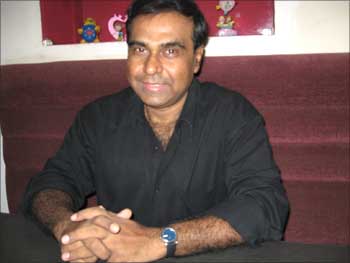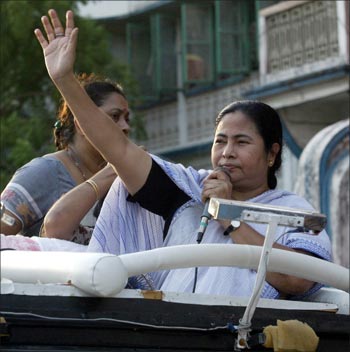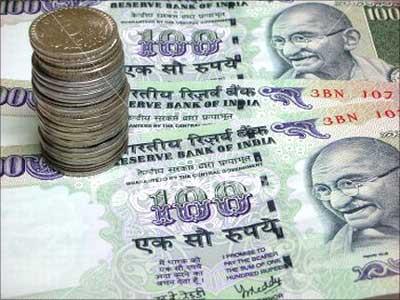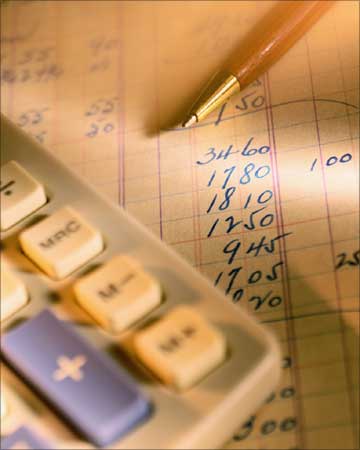 | « Back to article | Print this article |
Why Bengal is the most indebted state in India
Sitting on a huge debt burden of close to Rs 2 lakh crore (Rs 2 trillion), West Bengal government's finances are the worst among five highly-indebted states in India.
Revenue deficit of West Bengal is much higher than that of Uttar Pradesh, Maharashtra, West Bengal, Andhra Pradesh and Gujarat.
He said for 2009-10, revenue deficit (difference between revenue earnings and revenue expenditure) of the state stood at a staggering Rs 17,940 crore (Rs 179.4 billion) as compared to Rs 7,123 crore (Rs 71.23 billion) for Maharashtra.
Economist Abhirup Sarkar analysed this huge debt of Bengal as compared to other Indian states and explained what ails the state's economy.
Click NEXT to read further. . .
Why is Bengal one of the most indebted states?
Bengal's total debt=Rs 2.04 trillion
"West Bengal's total debt stands at Rs 2.04 lakh crore (Rs 2.04 trillion) at the moment. This is a huge amount. The situation came to such a pass that West Bengal Finance Minister Asim Dasgupta recently had to raise the VAT rates on luxury items by one per cent to 13.5 per cent. He also announced a 10 per cent cut in non-plan expenditures.
"The state finance minister has been trying to console us by saying that in Maharashta and Uttar Pradesh, the situation is worse whereas in Andhra Pradesh and Gujarat, the situation is slightly better."
However, Sarkar isn't ready to buy this argument. "Why hasn't Bengal's financial situation remained like this in the last 10 years? How can I forget that Uttar Pradesh, being the most indebted state, is enjoying a revenue surplus whereas the financial state of Bengal has remained static from the year 2000."
Click NEXT to read further. . .
Why is Bengal one of the most indebted states?
Poor collection of taxes
"What is even more surprising, said Sarkar, " is that the root cause lies in poor collection of taxes and introduction of VAT did not bring buoyancy in revenue collection."
The entire trade in the north-eastern region is routed through West Bengal, said Sarkar, adding, "there was corruption in collection of sales tax."
"No official receipts are given for tax collected and one has every right to suspect that the money might be diverted to party funds," he added.
Like he had done in the past, the state finance minister claims that it is a temporary crisis.
Click NEXT to read further. . .
Why is Bengal one of the most indebted states?
A close look at the problem . . .
Analysing the problem further, Sarkar said that a state government has to take several steps to counter financial problems. Whenever the receipts are more and expenditure less, the governments buy Reserve Bank of India's treasury bonds. And in case the situation is reverse, there is a provision of overdraft.
According to Sarkar, the West Bengal government has been trying to explain the debt ratio of Bengal according to such parameters.
"However, it's just an eyewash," the economist said. "There can be no routine overdraft for any state's finance whatsoever. Also, if things are hunky dory, why are austerity measures being adopted or why are VAT and excise rates hiked," he asked.
Click NEXT to read further. . .
Why is Bengal one of the most indebted states?
Debts aren't bad only if. . .
According to Sarkar, debts themselves are not bad. In fact, they often are considered yardsticks for measuring someone's financial capability.
"It is quite obvious that industrialist (Tata Group chairman) Ratan Tata will have more debts than me for the simple reason that he can clear the debts much faster and more easily than me."
However, the debts for Bengal are a tricky affair, said Sarkar.
About 97 per cent of Bengal's revenue is spent on paying interests for loans and also for salaries.
The rest 3 per cent is used for development. It is too meager an amount. No wonder, therefore, the infrastructure of the state is in a shambles.
And the burden of debt got bigger with time.
Click NEXT to read further. . .Why is Bengal one of the most indebted states?
Why Bengal is worse off than other states
He said that the main reason for poor revenue collection in Bengal was the decline in the trade and industry for a number of years.
Sarkar said that expenses on capital account were low as a result of which there was hardly any creation of assets.
"Bulk of the collection is being used for salary, interest payments and subsidy," he said.
Also, Bengal is the worst tax revenue collector and registers a dismal state domestic product ratio.
State Finance Minister Ashim Dasgupta feels that the crux of the problem lies in agriculture, which is the prime occupation for its residents and which is not taxed. But that again, said Sarkar, is another huge misconception.
"The policymakers simply ignore the fact that formal industry has declined in the state completely and that has added to the state's financial woes.
The fact that states like Bihar Chattisgrah and Uttar Pradesh exceed Bengal with respect to SDP ratio only proves the point.
"Left Front's faulty land acquisition policy only made matters worse", he said.
Click NEXT to read further. . .
Why is Bengal one of the most indebted states?
Wrong approach to small savings' loans
Sarkar is of the opinion that Bengal has always had a very wrong approach to small savings' loans, an important revenue generation tool for the state.
Bengal accounts for about one-sixth of India's total small savings, larger than that of the Uttar Pradesh and ranks just below Maharashtra.
For years, the state enjoyed the distinction of the largest contributor to the small savings pool.
In 2004-05, the net mobilisation went up more than Rs 1,000 crore (Rs 10 billion), touching Rs 9,697 crore (Rs 96.97 billion) against Rs 8,535 crore (Rs 85.35 billion) in 2003-04.
However, Bengal has now 'realised' that the small savings fund has turned into noose around its neck.
State Finance Minister Asim Dasgupta blames it on the Centre.
In fact, he has been lamenting that the recommendations of the Twelfth Finance Commission eluded several of his demands.
However, Sarkar feels that the problem lies in the state government's intent of treating the small savings loans as income. "It's time the government started adopting a different approach."
Click NEXT to read on . . .
Why is Bengal one of the most indebted states?
Bengal's internal revenue generation is 'awful'
As far as internal revenue generation is concerned, Bengal lags far behind other Indian states.
The reasons are many. Some of them are listed below:
- Lack of infrastructure;
- Lack of planning;
- Lack of coordination between different units;
- Rampant nepotism and a not-so-dynamic workforce;
- Massive administrative failure;
- Huge corruption at every level.
Speaking of corruption, Sarkar said that though this issue is but synonymous of any government functionary, it is not as institutionalised as in Bengal.
"Even while being corrupt, our state maintains a stoic discipline so much so that it gnaws into the very entrails of the state's economy."







